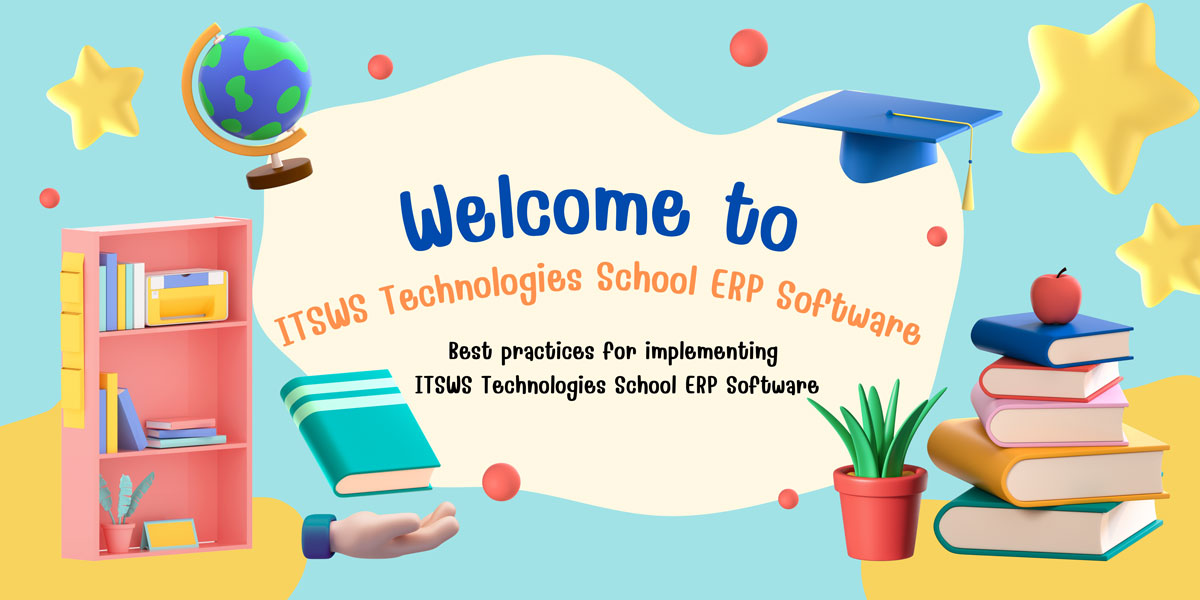- Publish on 2023-12-27 17:40:33
-

Awadhesh
- Basic
- 7 Articles
Implementing Enterprise Resource Planning (ERP) software in schools can significantly enhance administrative efficiency, streamline processes, and improve overall management. However, the successful integration of ERP systems requires careful planning, consideration of stakeholder needs, and adherence to best practices. This guide outlines key strategies for ensuring a smooth and successful ERP implementation in educational institutions. 
Define Clear Objectives and Requirements: Clearly articulate the goals and objectives of implementing ERP software in the school environment. Identify and document specific requirements, ensuring alignment with the school's strategic vision and operational needs.
Stakeholder Involvement: Involve key stakeholders, including administrators, teachers, staff, and parents, in the decision-making process. Gather input from end-users to understand their unique needs, challenges, and expectations.
Comprehensive Training Programs: Provide thorough training programs for all users to ensure they are proficient in using the ERP system. Ongoing training and support are essential to keep users updated on system changes and improvements.
Customization and Flexibility: Choose an ERP system that allows for customization to meet the specific needs of the school. Ensure the software is flexible enough to adapt to changes in educational processes and requirements.
User-Friendly Interface: Prioritize ERP software with a user-friendly interface to minimize the learning curve for users. A simple and intuitive design encourages widespread adoption and acceptance. Integration with Existing Systems: Ensure seamless integration with existing systems such as student information systems and accounting software. Verify compatibility with commonly used tools in educational settings. By following these best practices, schools can navigate the complexities of ERP implementation, ensuring a successful transition to an integrated and efficient management system.
A well-executed ERP implementation can lead to improved administrative processes, enhanced communication, and better overall educational outcomes. The successful implementation of ERP software in schools is a multifaceted process that requires careful planning, collaboration, and adaptability.

Benefits of School ERP Software in School Management
The importance of Enterprise Resource Planning (ERP) software in schools cannot be overstated in today's fast-paced and technology-driven educational environment. ERP systems offer a comprehensive, integrated management solution that can significantly enhance the operational efficiency and educational quality of schools.
- Streamlined Administrative Processes: ERP software integrates all major school administrative tasks, including admissions, billing, scheduling, and attendance, into a single system.
- Increased Financial Control: Financial management modules within ERP systems help schools manage budgets, expenses, and revenues more effectively.
- Improved Academic Management: ERP systems support academic management by facilitating curriculum development, scheduling classes, tracking student progress, and managing examinations and grading.
- Facilitates Remote Learning and Management: In the wake of global shifts towards online and hybrid learning models, ERP systems have become indispensable for managing remote learning environments.
How Much Does School Management Software ERP Cost?
The cost of school management software ERP (Enterprise Resource Planning) can vary widely based on a multitude of factors including the size of the school or educational institution, the range of functionalities and modules required, customization needs, deployment model (cloud-based vs. on-premises), and the vendor's pricing structure.
- Customization and Integration Costs: The costs can vary greatly depending on how much the software needs to be tailored to fit the school's specific processes and how many systems (like email, document management, etc.) need to be integrated.
- Implementation and Training Costs: Implementing the ERP system and training staff to use it effectively is crucial for success.
- License Fee: Cloud-based ERP systems typically operate on a subscription model, charging monthly or annually, which reduces upfront costs but is an ongoing expense.
ITSWS Technologies is a Leading Provider of ERP Solutions for Schools
We stand out as a prominent player in the realm of ERP software solutions, particularly tailored for educational institutions. With a robust track record and a reputation for excellence, we offer comprehensive ERP solutions designed to streamline operations, enhance efficiency, and elevate the management standards of schools.
- Cutting-Edge Technology: Leverages cutting-edge technologies to develop ERP solutions that are both innovative and adaptive. By staying abreast of the latest technological advancements, the company ensures that its ERP software remains at the forefront of industry standards, capable of meeting the evolving needs of modern educational environments.
- Customization and Scalability: Recognizing that each school has its unique requirements, we provide highly customizable ERP solutions. Whether it's adapting to specific administrative processes or integrating with existing systems, their software can be tailored to suit the individual needs and preferences of each school.
- User-Friendly Interface: Ease of use is paramount in any software solution, especially in educational settings where users may vary widely in technical proficiency.
